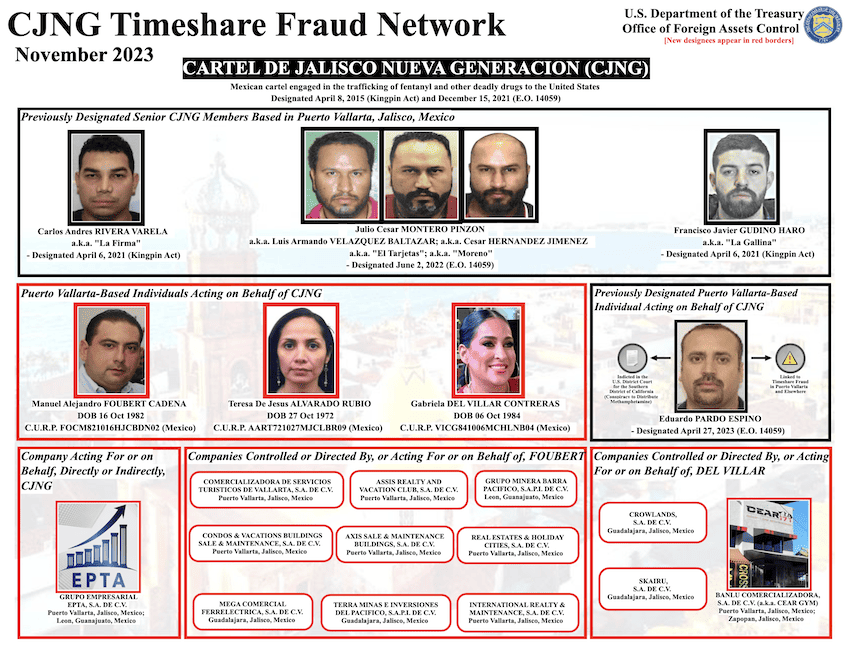The United States government has again clamped down on cartel-backed operators of a fraud scheme in Mexico that targets owners of timeshare properties in Puerto Vallarta and elsewhere.
The U.S. Treasury Department’s Office of Foreign Assets Control (OFAC) noted in a press release Thursday that it has sanctioned three Mexican individuals and 13 Mexican companies that “are linked, directly or indirectly, to timeshare fraud led by the Jalisco New Generation Cartel (CJNG).”

The action was coordinated with the FBI and the U.S. Drug Enforcement Agency (DEA), along with the Mexican government’s Financial Intelligence Unit (UIF).
It was the third set of similar sanctions issued this year. In March, OFAC sanctioned eight Mexican companies for timeshare fraud activities, and in April, 19 additional companies and seven Mexican individuals, including drug trafficking fugitive Eduardo Pardo Espino, were sanctioned.
“The CJNG cartel, a leading trafficker of narcotics like illicit fentanyl into the United States, generates substantial revenue for its multi-faceted criminal enterprise through its timeshare fraud network,” U.S. Treasury Secretary Janet Yellen said in the Thursday press release.
“CJNG uses extreme violence and intimidation to control the timeshare network, which often targets elder U.S. citizens and can defraud victims of their life savings.”

According to OFAC, the Mexicans sanctioned Thursday are Teresa de Jesús Alvarado Rubio, who has been linked to this fraud scheme for 15 years; Manuel Alejandro Foubert Cadena, involved for seven years; and Gabriela Del Villar Contreras, a lawyer linked to the collection of payments.
Most of the 13 sanctioned companies are linked to real estate businesses, OFAC said. These include Assis Realty and Vacation Club, Grupo Minera Barro Pacifico and International Realty & Maintenance.
The FBI said that in 2022 its Internet Crime Complaint Center received more than 600 complaints about Mexican timeshare scammers, with victims losing nearly US $40 million, according to an article in the Louisville Courier Journal.
The fraudsters use three basic steps, OFAC noted:
First, they call or send an email to someone who owns a timeshare and claim to have interested buyers ready with a purchase offer. They pretend to be a sales representative for a timeshare resale company.
If the unexpected offer is accepted, the scammer then asks the victim for up-front payments, allegedly to facilitate or expedite the sale, ensuring that the money will be refunded at the end.
Promised services are never carried out and, often, additional payments are sought — after which the timeshare owners begin to realize they have been scammed.
Later, victims are contacted by a “timeshare scam recovery company” that promises assistance in recuperating money lost in the first scam.
This CJNG’s thievery is part of a “diversification of criminal activities,” Nathan Jones, an expert in drug policy and Mexican studies at Rice University’s Baker Institute in Houston, said in the Courier Journal.
“These cartels and organized crime in Mexico are just getting into so many more sidelines,” he said, adding that the illegalities “look a lot more like classic mafia activities that we oftentimes saw in the United States.”
With reports from Milenio
